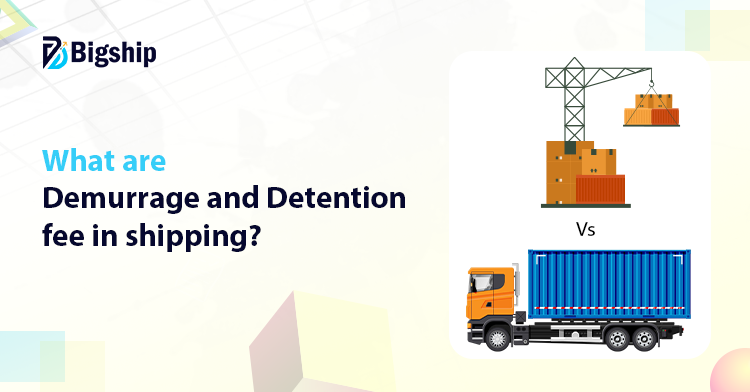Many people in the shipping business get confused between detention and demurrage, although both can quietly raise your costs. These two terms may sound similar, but they deal with different delays. When containers stay longer than the authorized free period, either inside or outside the port, demurrage and detention charges apply. Even a short delay can lead to unexpected expenses.

Let’s break down what these terms mean, why they matter, and how you can avoid paying them.
Demurrage and detention meaning in shipping
In shipping, demurrage and detention are two words that sound similar but mean different things. Both are charges, but they happen at different times and for different reasons.
Demurrage happens inside the port. Once your container arrives and is unloaded from the vessel, a free time is given to pick it up. If you don’t take it out within that period, the shipping line starts charging a daily fee. That extra time your loaded container spends sitting at the terminal is what we call demurrage. It’s like paying rent for keeping your cargo at the port longer than agreed.
Detention, on the other hand, happens outside the port. When you pick up the container and take it for unloading, you must return it empty within a fixed time. If you delay and bring it back late, detention charges apply. It covers the period the container stays with you after the authorized days.
Demurrage and detention charges
When a container arrives at its destination, it must be returned to the proper location, which is typically a port, terminal, or depot. Shipping lines depend on this quick return so their containers can move again for the next shipment. The global supply chain runs on this continuous cycle of pickup, delivery, and return.
Now comes the part that a lot of people forget about, demurrage and detention fees. These are the penalties that are charged for keeping containers longer than the free time allowed. If your loaded container sits too long at the port before pickup, demurrage applies. If you delay sending the empty container back after unloading, detention applies.
Demurrage vs Detention: What’s the difference?
Many people mix up demurrage and detention. Both bring extra costs, but for different reasons. Here’s a quick look at demurrage vs detention differences.
| Demurrage | Detention |
| Demurrage is applied inside the port. When your loaded container waits too long before pickup, these charges start ticking. | Detention is applied outside the port. It begins once you take the container out and delay returning it empty. |
| It’s like paying rent for keeping your goods at the terminal beyond free time. | On the other hand, detention is like paying a late return fee for holding the container longer than allowed. |
| The charge period starts after the free days end while the cargo is still at the port. | The charge period starts after pickup when the container leaves the port for unloading. |
| It affects port operations as containers occupy space needed for new arrivals. | It affects container circulation since shipping lines wait for their boxes to come back. |
When and why are you charged demurrage and detention charges?
You have to pay for demurrage and detention, when the shipping line’s complimentary period is out. These costs usually show up when something goes off track in the process. Let’s see what usually causes it.
- Many importers don’t check how much free time they actually have. Sometimes they assume wrong dates or misread the terms. That small mistake later turns into heavy charges.
- Shipments travel through long routes and involve several players. If you don’t have updates on where your cargo is, planning becomes hard. Hence, poor visibility can cause delays, resulting in these charges.
- Late updates or missed notifications can be one of the reasons. Imagine your vessel gets rescheduled, and you learn about it a day before arrival. That’s enough to mess up your pickup plan.
- Sometimes, a small human error like a missed call, a wrong date entered, or an internal miscommunication can be the cause. And before you know it, demurrage and detention charges land on your bill.
Why these charges matter for businesses?
Although demurrage and detention may appear to be minor additional costs, they can quickly cause problems for a corporation.
Higher shipping costs: Even a short delay adds up fast. A few extra days at the port can turn into a heavy bill.
Budget imbalance: These charges are often unplanned and they can easily push your shipping cost beyond what you expected.
Delivery delays: When containers stay longer at the port or get returned late, the entire delivery schedule slows down.
Warehouse congestion: Delayed containers take up space meant for new cargo, thus causing a mess in loading and unloading work.
Broken supply chain: One delay leads to another because of which customs, transport, and final delivery all feel the impact.
What is “Free Time” in shipping, and its importance?
“Free Time” in shipping is the number of days you get to pick up, unload, and return a container without paying any extra fees. Once this period is over, the shipping line starts charging you demurrage and detention, depending on the situation.
Here’s why “free time” in shipping is important for your business:
- It saves your money because staying within free time means no penalties.
- It keeps shipments on schedule. When you handle containers quickly, your goods move faster and reach on time.
- It avoids space issues in ports and terminal. Returning containers late can block storage at your warehouse or at the terminal.
How are demurrage and detention charges calculated?
Demurrage and detention charges are calculated based on how long you hold the container beyond the free time and under what conditions the delay happens. Several factors decide the final amount you pay:
Container size: Larger containers, like 40-foot ones, cost more than smaller 20-foot containers. Bigger size means higher daily charges.
Length of delay: The number of extra days directly affects the total cost. Charges often increase per day.
Port rules: Every port has its own demurrage and detention policy. Some allow longer free time, while others charge sooner.
Carrier policies: Different carriers have different rates. Some give flexible free days, others are strict and charge higher per day.
Ways to avoid demurrage and detention charges
No one likes paying extra fees, especially the ones that could have been avoided. So here are some ways to keep away with demurrage and detention fees.
Plan early and stay alert: Proper planning saves both time and money. So, keep your team aware of how demurrage and detention work. When everyone knows the rules and deadlines, delays are less likely to happen.
Keep track of your shipment: Always know where your container is. Real-time tracking helps you see delays before they become costly.
Prepare documents in advance: Missing or incorrect paperwork can slow down customs and cause delays. So you must make sure every document is ready and correct before the container arrives. Quick clearance means no waiting and no extra fees.
Communicate with everyone involved: Stay in touch with the shipping line, port, and agents. Because clear communication keeps everyone aligned and helps avoid costly confusion.
Key Takeaways
- Demurrage and detention are two different shipping fees that are both related to delays that go beyond the free time.
- Demurrage applies when your loaded container stays too long inside the port.
- Detention applies when you keep the container outside the port longer than allowed.
- These charges can increase your overall shipping cost and reduce profit margins.
- These charges usually depend on container size, number of extra days, port rules, and carrier policy.
Conclusion
Demurrage and detention are two different shipping fees that are both related to delays that go beyond the free time. By understanding the distinction between detention and demurrage, you may better manage your time and finances. Keeping an eye on the “free time”, tracking containers, and staying alert are small steps that can save your business from heavy and unnecessary charges.
FAQs
What is the meaning of demurrage charge in shipping?
Demurrage is the fee charged when your loaded container stays inside the port beyond the free time allowed by the shipping line.
What is detention in shipping?
Detention in shipping is the charge applied when you hold the container outside the port longer than the permitted free time before returning it empty.
What is the main difference between detention vs demurrage?
Demurrage applies for delays inside the port, while detention applies for delays outside the port after the container has been taken out.
How can I avoid demurrage and detention charges?
You can avoid these charges by following simple tips like plan in advance, track your cargo closely, prepare documents early, and return containers within the given time.





